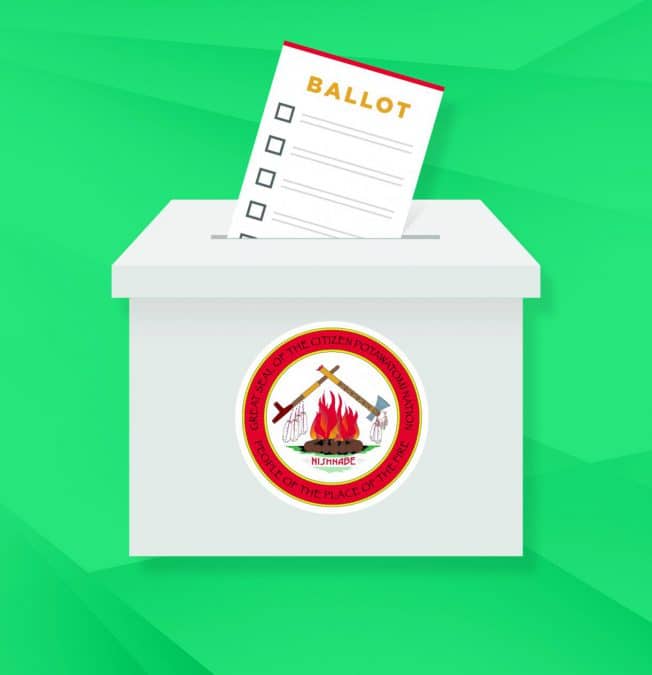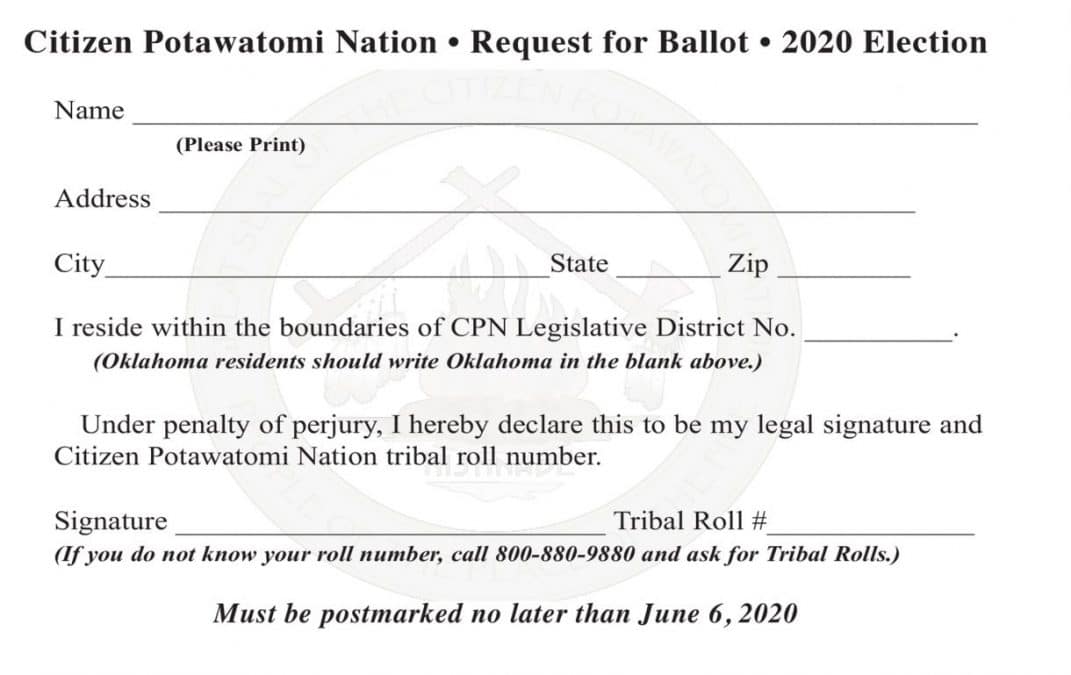Amidst the coronavirus outbreak, Citizen Potawatomi Nation’s 2020 Tribal elections will continue as scheduled through absentee ballot.

Due to the likelihood of continuing public health concerns from the COVID-19 outbreak, Festival 2020 and in-person voting are both cancelled.
Fortunately, CPN mailed members across the world absentee ballot request forms to their last known address at the end of March. At that time, the Election Committee estimated approximately 1,000 ballot requests had already been returned.
If members did not receive a ballot request card, CPN Tribal Rolls may not have an updated address in its database. Due to privacy laws, addresses and contact information from other entities like CPN Health Services or pharmacy cannot be shared automatically with Tribal Rolls. The election committee uses the most up-to-date information in the database to send the cards.
If you did not receive an absentee ballot request, you can still request one. A copy of the ballot request is included here, and you can download and print it at potawatomi.org/2020-ballot/.

You may also request a ballot by mailing a letter. Absentee ballot requests must be postmarked no later than June 6, 2020.
Enrolled members of voting age should send a signed letter to:
CPN Election Committee
PO Box 310
Tecumseh, OK 74873
The letter must state the following information:
Full legal name
CPN Tribal Roll number
Address
Legislative district they are casting a ballot for
A signature at the bottom of the letter
Once the Election Committee gets the letter and confirm its validity, they will mail out an absentee ballot.
It must be returned and be in the hands of the election committee no later than June 27, 2020 at 10 a.m. Election results will be posted as soon as they can be verified on potawatomi.org and CPN social media accounts.
Because of the health concerns associated with processing physical ballots and request forms, the election committee is researching ways to process them.
On the ballot
Three votes take place this year, including the Nationwide vote on the annual Tribal budget.
The budget, if approved, manages the Nation’s trust earnings. No principal from the fund is spent, but the budget pays for national service projects and the executive branch of the Tribe.
Secondly, Oklahoma members will vote to select at-large legislators for districts 9 and 12. These are Oklahoma-based seats that represent all Tribal members residing in the state. In District 9, incumbent Paul Wesselhöft and challenger Jay Laughlin are running, while in District 12, incumbent Paul Schmidlkofer is the only candidate.
All CPN voters regardless of location will be able to vote to reconfirm Justice Jennifer Lamirand for a six-year term on the CPN Supreme Court. She was nominated by Tribal Chairman John “Rocky” Barrett and confirmed by Tribal legislature at its February 2020 meeting.
Voting eligibility includes all CPN members who are at least 18 years old on Election Day.
Uniquely adaptable government
The Nation’s 2007 constitutional reform has, in hindsight, prepared the Tribal government for the situation now facing communities around the globe, specifically social distancing. While offices and governments learn the intricacies of online video conferencing, the CPN Legislature has used online teleconference meetings for more than a decade.
In 2002, discussions concerning a constitutional amendment began at the annual general council meeting. Tribal leaders later sent a questionnaire to more than 12,000 Citizen Potawatomi households concerning the need for reform. Following a plan developed by a technical working group, Tribal leaders spent 2003-2006 holding meetings in Oklahoma and around the United States to gain input on how to bring the Citizen Potawatomi government into the 21st century.
Following countless hours of drafting and debate, the working group formed the new constitution and put it to a vote of the Citizen Potawatomi people. It passed overwhelmingly with 83 percent of the vote in August 2007.
The reformed constitution created a truly representative government. It allowed proportional representation for Citizen Potawatomi across the U.S. At-large seats for districts 9 through 13 represent Oklahomans, in addition to three seats held in the legislature by the chairman, vice-chairman and secretary-treasurer. Districts 1 through 8 cover jurisdictions outside Oklahoma, ranging from one to more than a dozen states.
“Obviously we knew we would not be efficient at running such a government if we couldn’t meet by seeing and hearing from one another,” said Vice-Chairman Linda Capps. “The video conferencing system allowed our legislature to meet by video and work through our steps in a forward-thinking way.”
Citizens are able to observe proceedings and witness discussions on specific resolutions, and find archived meetings on potawatomi.org. The Tribe’s structure and ability to host video conference meetings remains unique in Indian Country. At the best of times and worst of times, it allows Citizen Potawatomi living far away from the Nation’s headquarters to have a direct and visible presence in the day-to-day business of governing Tribal affairs.
